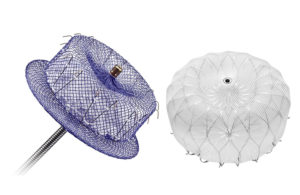
Left atrial appendage occlusion (LAAO) devices on the market include Abbott’s Amplatzer Amulet (left) and Boston Scientific’s Watchman (right). [Images courtesy of Abbott and Boston Scientific]
Women appear more likely than men to experience adverse events or lengthened hospital stays from left atrial appendage occlusion (LAAO) devices, the FDA announced today.
The FDA in its letter to health care providers said that researchers have yet to determine the reason for the difference — and that it is working with device makers to determine the cause.
For now, FDA officials still think that the benefits outweigh the risks when it comes to using LAAO devices such as Abbott’s Amplatzer Amulet and Boston Scientific’s Watchman and Watchman FLX to prevent people with atrial fibrillation from experiencing strokes.
The FDA advised health providers to continue monitoring people with LAAO devices, discussing risks and benefits, and reporting any adverse events.
The letter to health care providers comes after an analysis of real-world data in the National Cardiovascular Data Registry LAAO Registry from 49,357 patients — 41.3% women and 58.7% men — undergoing LAAO procedures from 2016 to 2019. The researchers from UC San Diego, Yale University, and other U.S. and Canadian institutions found that 6.3% of the women experience adverse events versus 3.9% of the men.
There were also differences between women and men when it came to major adverse events (4.1% versus 2.0%) and hospital stays longer than one day (16.0% versus 11.6%).
FDA officials acknowledged that the study, published in the August 11 edition of JAMA Cardiology — had limitations. The data only involved one device, the first-generation Watchman, and it was not randomized or including longer-term outcomes beyond in-hospital events. But the FDA added: “The analysis provides results from a large registry of patients treated with LAAO implants in the U.S.”